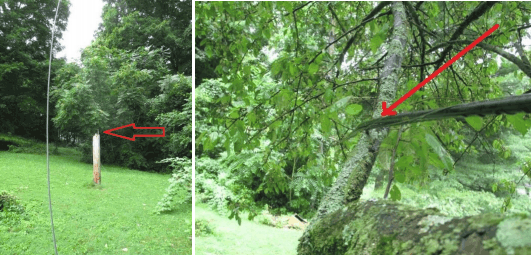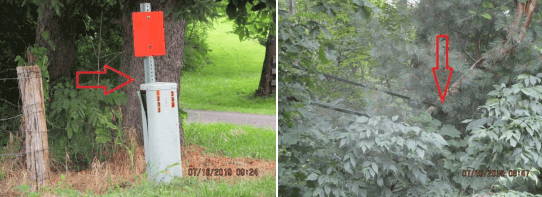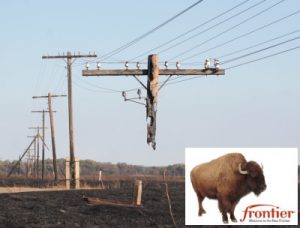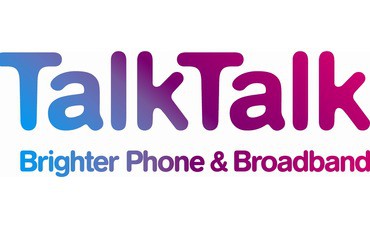
A broken Frontier telephone pole (left). Frontier phone cables left stretched against a tree (right) Images: PUCO
The Public Utilties Commission of Ohio (PUCO) has filed a formal complaint against Frontier North, Inc. (d/b/a Frontier Communications), citing a spike in customer complaints and evidence the company’s landline services have dramatically deteriorated in the state.
The PUCO is concerned Frontier’s alleged poor service may result in safety concerns, such as a customers’ inability to contact emergency services, doctors, and family and friends.
“Customer complaints indicating extensive telecommunication outages are troubling and deserve to be examined,” stated PUCO Chairman Sam Randazzo. “Today the PUCO is taking steps to investigate allegations of poor service quality.”
This is only the latest in a series of actions the state regulator has taken against Frontier for poor performance. The company previously promised to prioritize service outage repairs over new installations, but the regulator reports it received an unprecedented 2,802 consumer contacts regarding Frontier between January 1, 2018 and July 31, 2019.
 Most of the problems are occurring in service areas that Frontier acquired from Verizon Communications in 2010, primarily in southern and eastern Ohio. The regulator’s complaint includes 33 citations against Frontier for extended service outages, some that have lasted for months, as well as allegations the company has failed to provide adequate and reliable phone service in its Ohio service areas. The complaint recommends the Commission “conduct a thorough investigation” on the matter.
Most of the problems are occurring in service areas that Frontier acquired from Verizon Communications in 2010, primarily in southern and eastern Ohio. The regulator’s complaint includes 33 citations against Frontier for extended service outages, some that have lasted for months, as well as allegations the company has failed to provide adequate and reliable phone service in its Ohio service areas. The complaint recommends the Commission “conduct a thorough investigation” on the matter.
The complaint:
Frontier’s alleged efforts to repair [reported issues] within 24 hours or Frontier reporting that the issue had been repaired within 72 hours, often times customers’ service would not work within days of Frontier reporting it has repaired the issue.
For example, a [residential] consumer contacted the PUCO Call Center on March 4, 2019 stating her telephone line had been out of service since January 20, 2019. The consumer stated that she contacted Frontier on February 7 or 8, 2019 and that Frontier had committed to making repairs no later than February 26, 2019. When repairs did not occur by February 26, 2019, the consumer stated that she contacted Frontier again and was informed the repairs would occur by March 19, 2019. During Staff’s investigation, Frontier informed Staff that it was notified of the service issue regarding no dial tone on this [residential] account on February 14, 2019 and that service was repaired on March 7, 2019. Repairing an issue on March 7, 2019 is 21 days after it was reported on February 14, 2019, thus 18 days in violation of the 72-hour repair requirement times for instances of failure.

Damaged pedestal (left); Large tree limb left on Frontier phone cables (right). Images: PUCO
From July 11, 2019 to July 23, 2019, PUCO staff conducted field inspections which revealed facilities that appear to lack the proper maintenance, including damaged aerial terminals and splice cases, excessive vegetation, damaged pedestals, and unstable and damaged poles.
The PUCO telephone service areas map shows that Frontier North covers parts of 64 of Ohio’s 88 counties, including Marion, Crawford, Richland, Ashland, Morrow, Sandusky, Ottawa, Coshocton, Muskingum, Fairfield, Pike, and Ross. Verizon itself acquired those service areas from GTE (General Telephone) in 2000.
Nationally, Frontier Communications is in financial distress. The company now serves 4.3 million customers, down 200,000 from the same time last year. Across all divisions, Frontier is losing customers, particularly those subscribed to residential and commercial landline service and its resold satellite TV service. Frontier is also losing large numbers of TV customers in its FiOS fiber to the home service areas. The company has accumulated $17 billion in debt with a decreasing likelihood it will repay that debt on time.

Pedestal Damage. Images: PUCO
Despite the financial difficulties, Frontier is still obligated by law to meet basic service standards. Utility regulators in multiple states are now questioning whether Frontier is still achieving this. For a second time, Frontier spokesman Javier Mendoza signaled the company is burdened with an uncompetitive, high cost business model.
“Frontier takes service quality very seriously. While we disagree with the report’s assertions, we look forward to respectfully and directly addressing the issues raised by staff with the Public Utilities Commission,” Mendoza wrote in an email to the Marion Star. “Issues raised in the report focus on complaints in rural and high cost service areas; yet while Frontier only serves some 10% of Ohio’s wireline phone lines, Frontier bears 100% of the obligation to provide phone service to customers in the most rural, remote, and high-cost parts of its service area. This model creates costly operational burdens that Frontier’s competitors do not bear and is inconsistent with a competitive market.”
“Providing reliable telecommunications and broadband service to our customers is our highest priority. Frontier is dedicated to safety and takes seriously its commitment to serve Ohio customers and support 911 services,” Mendoza added.


 Subscribe
Subscribe

 An undisclosed number of Frontier Communications customers in West Virginia were without phone service during the Christmas-New Year’s Day holidays because of copper thefts and slow repair crews that did not begin repairs for up to two weeks after the outages were reported.
An undisclosed number of Frontier Communications customers in West Virginia were without phone service during the Christmas-New Year’s Day holidays because of copper thefts and slow repair crews that did not begin repairs for up to two weeks after the outages were reported.


 A decision by Great Britain’s broadband industry to follow America’s lead consolidating the number of competitors to “improve efficiency” and wring “cost savings” out of the business resulted in few service improvements and a much bigger bill for consumers.
A decision by Great Britain’s broadband industry to follow America’s lead consolidating the number of competitors to “improve efficiency” and wring “cost savings” out of the business resulted in few service improvements and a much bigger bill for consumers. As consumers find fewer and fewer options for broadband, they are also discovering a larger bill, fueled by runaway rate increases well in excess of inflation. While consolidated markets in the United States and Great Britain increasingly lack enough competition to temper rate increases, heavy competition on the European continent has resulted in flat or even lower prices for broadband along with significant service upgrades. British consumers now pay up to 50% more for broadband than many of their European counterparts in Germany, France, the Benelux countries, and beyond.
As consumers find fewer and fewer options for broadband, they are also discovering a larger bill, fueled by runaway rate increases well in excess of inflation. While consolidated markets in the United States and Great Britain increasingly lack enough competition to temper rate increases, heavy competition on the European continent has resulted in flat or even lower prices for broadband along with significant service upgrades. British consumers now pay up to 50% more for broadband than many of their European counterparts in Germany, France, the Benelux countries, and beyond. In France, competition is forcing providers to move towards fiber optic broadband and scrap DSL service. But French consumers are not paying a premium for upgrades necessitated by competition on the ground. While British households pay close to $60 a month, a comparable package in France from Orange known as L’essentiel d’internet à la maison costs only $36.50 a month, including a TV package and unlimited calling to other landlines. But the deal gets even better if you shop around. Free, a major French competitor, offers a near-identical package for just $32.19 a month. In the United States, packages of this type can cost $130 or more if you do not receive a promotion, $99 a month if you do.
In France, competition is forcing providers to move towards fiber optic broadband and scrap DSL service. But French consumers are not paying a premium for upgrades necessitated by competition on the ground. While British households pay close to $60 a month, a comparable package in France from Orange known as L’essentiel d’internet à la maison costs only $36.50 a month, including a TV package and unlimited calling to other landlines. But the deal gets even better if you shop around. Free, a major French competitor, offers a near-identical package for just $32.19 a month. In the United States, packages of this type can cost $130 or more if you do not receive a promotion, $99 a month if you do. In Britain, there are fewer options for customers to seek a better deal, and the remaining providers know it. As a result, marketplace conditions and an increasing lack of competition have made conditions right for rate increases. BT, Sky, Virgin, and Plusnet (controlled by BT) have all taken advantage and hiked prices once again this year between 6-10%, on top of other large rises.
In Britain, there are fewer options for customers to seek a better deal, and the remaining providers know it. As a result, marketplace conditions and an increasing lack of competition have made conditions right for rate increases. BT, Sky, Virgin, and Plusnet (controlled by BT) have all taken advantage and hiked prices once again this year between 6-10%, on top of other large rises.
